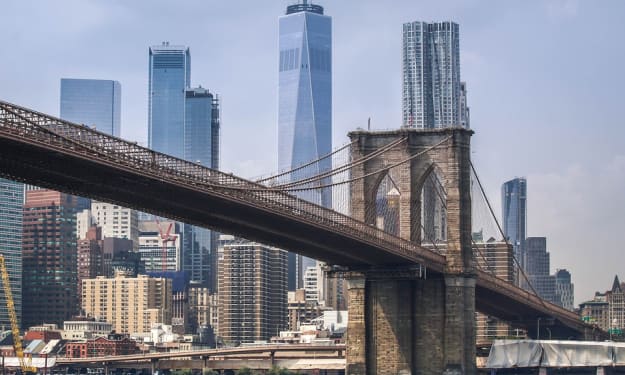Saratoga
The First Great Battle That led To The Birth Of A Nation

In light of what happened on January 6th we should be reminded of the great struggles that were fought in order to establish this nation. This is one such story.
Through-out the history of the world there have been countless military engagements and battles that have decided the fate of nations. The development of Western Culture that we are experiencing today is a direct result of all the blood that was spilled and the millions who have fallen in writing history. In ancient Greece, the battle of Salamis is certain to be one of the most decisive battles in history for if Greece had not defeated the Persian empire then, Western civilization as we know it today could very well have been an Islamic state. The Battle of Munda marked the end of the Roman Republic and signaled the beginning of the Roman Empire when Julius Caesar defeated the Roman Republic's army and became Dictator. In 732 AD the battle of Tours in France stopped the spread of western expansion of the Islamic Saracens by the Christian Franks. This victory preserved the Christian faith and protected England and France from becoming under the influence of the Islamic religion. The Battle of Hastings in which the Norman victory was responsible for the spread of language similar to the one used by Americans and the English today.
History itself is full of military battles, some more poignant in relevancy to the direction a nation heads. But, it was this one military engagement that was fought that had the most profound effect on the world as we know it today took place in Saratoga, New York in 1777. In all of history's conflicts none of these have been more decisive in terms of the direction in which nations have charted since occurred when the American Colonists were in a bitter struggle to win independence from Great Britain. This battle which actually consisted of two engagements occurred in the fall of 1777. On September 19 the British army advanced upon the Americans and the battle of Saratoga at Freeman's farm was fought. The British led by General Burgoyne had a small and short lived victory even though hundreds of his men fell. The Colonists led by General Gates faired much better. Luck, tactical miscalculations on part of the British, and timing were all influential in securing an advantage by the Colonists over the British army. One of General Gates officers Benedict Arnold whose ego got the better of him some historians now speculate at the time the second battle at Bemis Heights was unfolding either he was drunk or attempting to show his bravado under fire got himself wounded, but none the less kept the American forces to gain the advantage for ultimate victory.
A excerpt from an account of how the Colonists gained the victory they so desperately needed and really proved that the Revolutionary War could be attained is detailed here: "On September 19, 1777 the Royal army advanced upon the American camp in three separate columns within the present day towns of Stillwater and Saratoga. Two of them headed through the heavy forests covering the region; the third, composed of German troops, marched down the river road. American scouts detected Burgoyne's army in motion and notified Gates, who ordered Col. Daniel Morgan's corps of Virginia riflemen to track the British march. About 12:30 p.m., some of Morgan's men brushed with the advance guard of Burgoyne's center column in a clearing known as the Freeman Farm, about a mile north of the American camp. The general battle that followed swayed back and forth over the farm for more than three hours. Then, as the British lines began to waver in the face of the deadly fire of the numerically superior Americans, German reinforcements arrived from the river road. Hurling them against the American right, Burgoyne steadied the wavering British line and gradually forced the Americans to withdraw. Except for this timely arrival and the near exhaustion of the Americans' ammunition, Burgoyne might have been defeated that day. Though he held the immediate field of battle, Burgoyne had been stopped about a mile north of the American line with his army roughly treated. Shaken by his "victory," the British commander ordered his troops to entrench in the vicinity of the Freeman Farm and await support from Clinton, who was supposedly preparing to move north toward Albany from New York City.
For nearly three weeks he waited but Clinton did not come. By now Burgoyne's situation was critical. Faced by a growing American army without hope of help from the south, and with supplies rapidly diminishing, the British army became weaker with each passing day. Burgoyne had to choose between advancing or retreating. He decided to risk a second engagement, and on October 7 ordered a reconnaissance-in-force to test the American left flank. Ably led and supported by eight cannon, a force of 1,500 men moved out of the British camp. After marching southwesterly about three-quarters of a mile, the troops deployed in a clearing on the Barber Farm. Most of the British front faced an open field, but both flanks rested in woods, thus exposing them to surprise attack. By now the Americans knew that Burgoyne's army was again on the move and at about 3 p.m. attacked in three columns under Colonel Morgan, Gen. Ebenezer Learned, and Gen. Enoch Poor. Repeatedly the British line was broken, then rallied, and both flanks were severely punished and driven back. Gen. Simon Fraser, who commanded the British right, was mortally wounded as he rode among his men to encourage them to make a stand and cover the developing withdrawal. Before the enemy's flanks could be rallied, Gen. Benedict Arnold -who had been relieved of command after a quarrel with Gates- rode onto the field and led Learned's brigade against the German troops holding the British center. Under tremendous pressure from all sides, the Germans joined a general withdrawal into the fortifications on the Freeman Farm. Within an hour after the opening clash, Burgoyne lost eight cannon and more than 400 officers and men. Flushed with success, the Americans believed that victory was near. Arnold led one column in a series of savage attacks on the Balcarres Redoubt, a powerful British fieldwork on the Freeman Farm. After failing repeatedly to carry this position, Arnold wheeled his horse and, dashing through the crossfire of both armies, spurred northwest to the Breymann Redoubt. Arriving just as American troops began to assault the fortification, he joined in the final surge that overwhelmed the German soldiers defending the work. Upon entering the redoubt, he was wounded in the leg. Had he died there, posterity would have known few names brighter than that of Benedict Arnold. Darkness ended the day's fighting and saved Burgoyne's army from immediate disaster.
That night the British commander left his campfires burning and withdrew his troops behind the Great Redoubt, which protected the high ground and river flats at the northeast corner of the battlefield. The next night, October 8, after burying General Fraser in the redoubt, the British began their retreat northward. They had suffered 1,000 casualties in the fighting of the past three weeks; American losses numbered less than 500. After a miserable march in mud and rain, Burgoyne's troops took refuge in a fortified camp on the heights of Saratoga. There, an American force that had grown to nearly 20,000 men surrounded the exhausted British army. Faced with such overwhelming numbers, Burgoyne surrendered on October 17, 1777. By the terms of the Convention of Saratoga, Burgoyne's depleted army, some 6,000 men, marched out of its camp "with the Honors of War" and stacked its weapons along the west bank of the Hudson River. Thus was gained one of the most decisive victories in American and world history."
Once news of the British surrender at Saratoga reached France Benjamin Franklin urged King Louis XVI to sign the Franco-American alliance. This allowed France to really offer more support for the American cause in supplies and arms. When the French intervened in behalf of the Americans totally transformed the Revolutionary war into a global conflict. As a consequence Great Britain was forced to divert more resources from fighting the war in North America back to Europe for fear of the French and Spanish would seek to unleash conflicts in Europe. General Burgoyne's failed campaign marked the major turning point in the war for America's independence.
The American victory at Saratoga convinced France to enter in the war as an ally of the fledgling United States. It would be French with their military assistance that would keep the new nation of America's cause from collapse and tip the balance at Yorktown in 1781. The American Revolutionary War also would reach to nearly every quarter of the globe as Spain and the Netherlands would become involved. But more importantly the ideals of the then rebel Americans would be exported inspiring people throughout the world with the hope of liberties and freedom can be attained. This all would not have happened if the American's hadn't defeated the worlds super power of the time Great Britain at Saratoga in the fall of 1777. America would not be America that we all know today.
About the Creator
Dr. Williams
A PhD in Economics. Author of National Economic Reform's Ten Articles of Confederation.






Comments
There are no comments for this story
Be the first to respond and start the conversation.